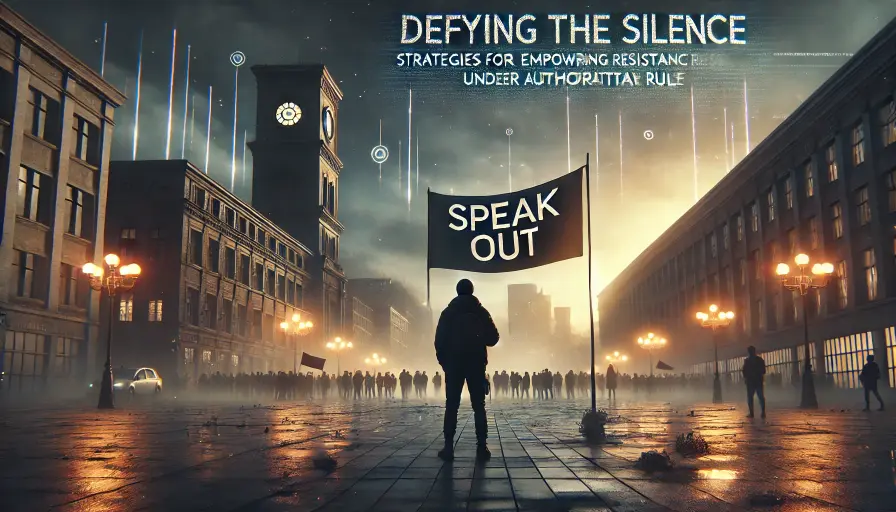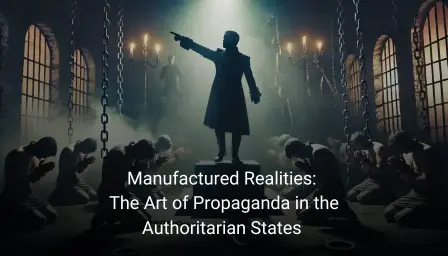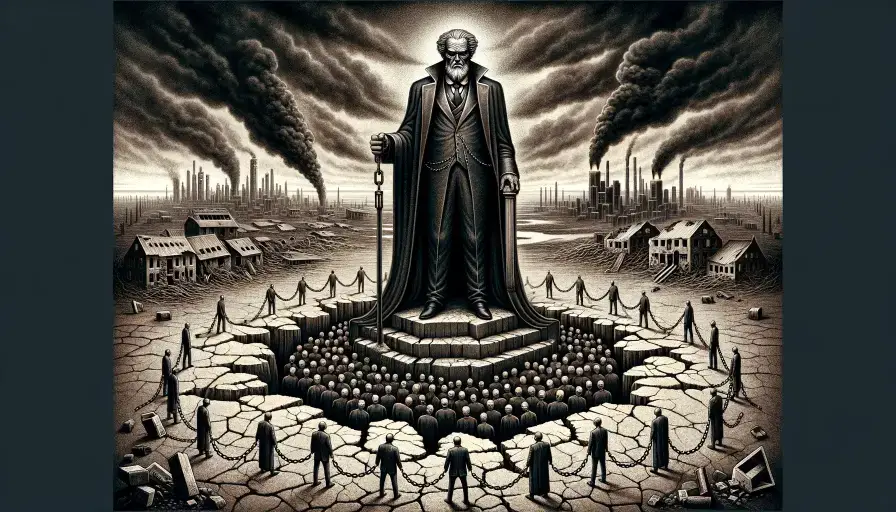Introduction:
Resistance under authoritarianism is often stifled by regimes that silence dissent, creating a chilling effect that traps individuals in a web of fear and learned helplessness. It is a testament to the complex interplay of psychological barriers that must be understood and overcome.
This article examines the psychological mechanisms that sustain authoritarian regimes and explores strategies for individuals to overcome these barriers, reclaim their rights, and resist oppression. We will analyze the psychological barriers that inhibit resistance, including fear, conformity, and the insidious power of propaganda.
We will also explore how authoritarian governments exploit ethnic divisions to maintain control. By analyzing these barriers, we aim to identify pathways toward empowerment, courage, and the reclamation of individual agency. Despite the psychological barriers, resistance under authoritarianism has taken many forms throughout history. While authoritarian regimes often seek to crush the spirit of resistance, history is replete with examples of individuals who dared to defy silence and catalyzed movements that toppled oppressive regimes.
This article will examine these historical lessons and explore contemporary strategies for resistance, including the vital role of digital activism and international solidarity.
The Paradox of Silence: Why People Remain Silent Under Authoritarianism
Denying freedom of speech and suppressing democratic rights has become all too common in many parts of the world. From the repressive regimes of Africa to the rising tide of authoritarianism across the globe, the ability of individuals to freely express their views and engage in civic discourse is under constant threat.
Despite facing oppression, a troubling paradox emerges in the silence of those whose rights are violated. This is perplexing, considering the innate human desire for freedom and self-expression, which might compel individuals to resist and speak out. However, the psychological impact of living under authoritarian rule can profoundly shape an individual’s willingness and ability to challenge the status quo.
Psychological Barriers to Resistance under Authoritarianism
Fear and Learned Helplessness: Barriers to Resistance
The ever-present threat of retribution can instill a deep-seated fear, paralyzing individuals and leading them to self-censor and comply with the demands of the oppressive system. Under authoritarian regimes, the consequences of speaking out can be severe, ranging from imprisonment and physical harm to retaliation against loved ones. This fear is often amplified by examples of individuals who have faced harsh consequences for their dissent ( Brysk, A. 2015)
For example, in Zimbabwe, under Robert Mugabe’s rule, those who voiced opposition faced arbitrary arrests, torture, and even disappearances. These experiences instilled a profound sense of helplessness and paralysis among the Zimbabwean people, making many reluctant to challenge the authoritarian rule despite the violation of their fundamental rights. This demonstrates how fear can create a cycle of silence, where individuals become increasingly hesitant to speak out against injustice.
Martin Seligman, a psychologist, introduced the concept of learned helplessness, which further compounds this issue. Repetition of the futility of actions in the face of overwhelming power can condition individuals to believe that resistance is ultimately futile and that their fate is entirely out of their control.
“Learned helplessness is the giving-up reaction, the quitting response that follows from the belief that whatever you do doesn’t matter.” – (Martin E.P. Seligman 1975).
This sense of powerlessness and the overwhelming fear of consequences make speaking out or engaging in acts of resistance seem too risky and overwhelming to pursue.
Conformity and Obedience: Social Pressures that Stifle Dissent
Another significant barrier to resistance is the powerful influence of social conformity and the desire to “fit in” within an authoritarian society. When the prevailing social norms and expectations reinforce the need for obedience and compliance, individuals can internalize these values, making it increasingly difficult to challenge the status quo.
The psychological phenomenon of obedience to authority, as famously demonstrated in the Milgram experiments, highlights the human tendency to defer to those in positions of power, even when their directives conflict with our moral principles.
This propensity to obey can intensify in authoritarian regimes as the consequences of defiance escalate and the social pressures to conform become overwhelming.
The fear of social ostracization and the desire to maintain one’s position within the community can further deter individuals from resisting. This emphasizes the critical role of civil society organizations in providing support and mitigating such grievances.
Even in the face of oppression, many people remain silent and compliant, even in the face of their oppression, fearing social ostracism, ridicule, or exclusion from social networks.
Internalized Oppression and the Normalization of Authoritarianism: The Role of Propaganda and Indoctrination
Over time, the psychological impact of living under authoritarian rule can lead to the internalization of oppression, where individuals come to accept and even justify the oppressive system that governs their lives.
Many autocratic regimes facilitate this process through relentless propaganda, indoctrination, and gradual erosion of critical thinking skills, which may impose a significant barrier to nurturing a robust civil society.
Narratives that normalize and legitimize the actions of the ruling power can bombard individuals, leading them to rationalize and accept the status quo, even when it violates their fundamental rights.
This psychological phenomenon, cognitive dissonance reduction, allows people to minimize the discomfort and contradictions they experience, further entrenching authoritarianism’s hold on their lives.
Case study: North Korea’s authoritarian regime has created a profound psychological barrier to resistance, with the state exerting almost total control over its citizens.
This is mainly due to a pervasive system of indoctrination and surveillance, which has incubated a climate of fear and compliance among its citizens.
The threat of harsh punishment, including imprisonment, torture, and execution, for any form of dissent has instilled a deep-seated terror within the population. This fear is further exacerbated by the regime’s targeting of not just individuals but their entire families.
The concept of learned helplessness is also evident in the North Korean context, as many North Koreans have become conditioned to believe their actions are meaningless, eroding the will to challenge the status quo.
The pervasive nature of North Korea’s propaganda and indoctrination has led to the normalization of authoritarianism within society, with citizens bombarded with narratives justifying the regime’s actions and portraying the Kim family as infallible leaders.
These examples from North Korea highlight the complex interplay of psychological factors that can inhibit resistance, from fear of consequences to the erosion of hope and agency.
Beyond North Korea, numerous countries around the world exhibit authoritarian tendencies. In regions of Africa, Asia, and Latin America, individuals face the suppression of their fundamental rights by authoritarian governments that rely on intimidation, propaganda, ethnic division, and the dismantling of democratic institutions.
Within these countries, a harmful combination of ethnic conflicts, limited resources, and the consolidation of money and power among a few privileged individuals in the name of a pseudo-democratic election frequently intensified the psychological obstacles to opposition.
Apathy and Cynicism: The Erosion of Hope Under Authoritarianism
Prolonged exposure to the relentless suppression of rights and the impossible nature of authoritarian power can lead to the erosion of hope and the emergence of apathy and cynicism.
As individuals witness the futility of resistance and their oppressors’ apparent invincibility, they can become increasingly disillusioned, leading them to disengage and accept their circumstances rather than risk the consequences of defiance.
This psychological state perpetuates the cycle of silence and non-resistance. Without hope and the belief that change is possible, individuals are less likely to summon the courage and motivation to challenge the oppressive system, further entrenching authoritarian power.
While these psychological barriers—fear, conformity, and learned helplessness—can seem overwhelming, they are not insurmountable. History shows that individuals and movements have successfully navigated these obstacles and reclaimed their agency even in the most repressive environments.
The next step in understanding resistance under authoritarian rule is to explore the strategies and tools to empower individuals to break free from these constraints. People can challenge even the most entrenched authoritarian regimes by cultivating courage, resilience, critical thinking, and leveraging collective action.
Pathways to Resistance under Authoritarianism and Empowerment: Cultivating Courage and Resilience
Given the formidable psychological barriers to resistance under authoritarian rule, cultivating courage and resilience becomes crucial to empowering individuals to speak out and challenge the status quo.
This process often begins with developing solid social support networks where individuals can find solidarity, encouragement, and the mutual reinforcement needed to overcome their fears and take action.
Encouraging a sense of individual and collective agency can help people overcome the paralysis of learned helplessness. By nurturing a belief in their ability to effect change, even in the face of overwhelming odds, individuals can shed apathy and cynicism and embrace the power of their voice and actions. This potential for change and a brighter future offers a beacon of hope against authoritarian oppression.
Gene Sharp, a foundational figure in resistance studies, argues that nonviolent action is one of the most effective ways to challenge authoritarian regimes. Sharp outlines methods such as strikes, protests, and civil disobedience that can destabilize repressive governments by undermining their pillars of support—whether economic, political, or social.
His work emphasizes that, even in highly repressive environments, non-violent resistance can erode the legitimacy of authoritarian rulers without resorting to violence, avoiding the risks of militarization.
Guillermo O’Donnell’s analysis of authoritarian regimes complements Sharp’s theories. In it, he highlights the concept of ‘bureaucratic authoritarianism’—a system in which elites maintain control through coercion and exclusionary policies.
O’Donnell notes that resistance in such regimes often arises from marginalized groups whose disenfranchisement creates the conditions for oppositional movements.
Sharp’s strategies for non-violent resistance and O’Donnell’s insights into the structural dynamics of authoritarianism create a comprehensive framework that helps us understand how to confront and ultimately overthrow authoritarian regimes. Non-violent activism is critical in resistance under authoritarianism, allowing oppressed groups to push back without resorting to violence.
Promoting Critical Thinking and Media Literacy
In the age of pervasive misinformation and authoritarian propaganda, the development of critical thinking skills and media literacy becomes a vital tool in the fight against oppression.
By equipping individuals with the ability to analyze, question, and verify the information they consume, we can empower them to challenge the narratives that seek to legitimize and perpetuate authoritarian rule.
This includes identifying and resisting false or misleading information and accessing reliable, independent news and analysis sources. As citizens become more discerning and informed, they can make more meaningful and autonomous decisions about their engagement with the political and social realities that shape their lives. Digital tools have empowered resistance under authoritarianism, giving dissidents new ways to organize.
Embracing Civic Engagement and Non-Violent Activism
Authoritarian oppression has repeatedly shown the power of collective action and non-violent activism. From the inspiring civil rights movements in Africa to the Velvet Revolution in Eastern Europe, the groundswell of grassroots resistance has proven to be a formidable force in challenging and ultimately dismantling repressive regimes.
Individuals can harness collective action’s profound capacity for change by actively participating in civic engagement, reinforcing the importance of organizational structures in civil society.
People can achieve this through various means, such as peaceful protests, boycotts, or civil disobedience. This approach helps to amplify individual voices and further a sense of empowerment, community, and shared purpose that can sustain the struggle against authoritarianism.
Digital Activism and Cyber Resistance under Authoritarianism: The Potential and Challenges of Online Resistance |
In the era of digital globalization, activism has transcended traditional boundaries, morphing into cyber resistance—a formidable tool against authoritarian oversight. The digital realm offers unprecedented opportunities for mobilizing support, disseminating critical information, and coordinating actions, all while under the radar of oppressive regimes(Shirky, C. 2008).
Social media platforms have become modern-day agoras for political discourse, enabling activists to broadcast injustices globally. However, this digital tool is double-edged: while empowering dissent, it also opens the door to surveillance, cyber-attacks, and the spread of misinformation by authoritarian governments.
The challenge for digital activists is to navigate these hazards and continuously innovate to stay ahead of oppressive forces that seek to silence dissent through technological means.
The Arab Spring and the Hong Kong protests exemplify the potent force of digital activism in rallying citizens toward collective action and challenging authoritarian regimes. They demonstrate the transformative power of digital tools in the modern era of resistance.
International Solidarity and Global Movements: Amplifying Resistance and Building a United Front
Global solidarity and movements strengthen the fight against authoritarianism, which transcends national borders. Our world’s interconnectivity today means that a cry for freedom in one nation can echo across continents, compelling individuals, organizations, and governments worldwide to lend their support.
International coalitions, global human rights organizations, and transnational advocacy networks play pivotal roles in applying pressure on authoritarian regimes through diplomatic channels, economic sanctions, and international legal mechanisms.
This global backing amplifies local activists’ efforts and provides them with critical resources, protection, and legitimacy( Keck, M. E., & Sikkink, K. 1998). The global struggle against apartheid in South Africa and the global support for democracy movements in Myanmar illustrate the power of international solidarity in bolstering resistance forces.
These examples underscore the importance of a united global front in championing freedom and human rights, reinforcing the idea that the world stands together in the face of authoritarian oppression.
Ethical Considerations in Resistance under Authoritarianism: Navigating Moral Dilemmas in the Fight for Freedom
Navigating the ethical terrain of resistance against authoritarianism presents unique dilemmas and considerations.
Activists face moral dilemmas, such as justifying civil disobedience, navigating the ethics of whistleblowing, and defining the boundaries of non-violent protest. These ethical considerations involve balancing the urgency of resisting oppression with a commitment to justice and non-harm.
For instance, leaking sensitive information to expose injustices must weigh the potential harm against the imperative to reveal the truth. Similarly, civil disobedience raises questions about how violating laws can be morally acceptable in pursuing higher ethical standards and social justice.
These complex ethical challenges require a nuanced understanding of the context of resistance and the broader implications of actions taken.
Reflecting on historical precedents, such as the ethical debates surrounding the anti-apartheid movement or the resistance against totalitarian regimes in Eastern Europe, can offer insights into navigating these moral landscapes.
Ultimately, ethical considerations in resistance underscore the importance of maintaining integrity, respect for human rights, and a steadfast commitment to democracy and freedom, even in the face of daunting opposition.
Lessons from History: Strategies and Inspiration for Contemporary Resistance
Exploring the historical context of resistance movements provides valuable lessons for contemporary struggles against authoritarianism. History is replete with examples of the indomitable spirit of resistance leading to significant political and social change.
An example of this is the civil rights movement in the United States, which demonstrates the effectiveness of non-violent protest and civil disobedience in bringing about significant changes in legislation to combat racial segregation and discrimination.
Similarly, the Velvet Revolution in Czechoslovakia highlights the impact of peaceful mass protests and the role of intellectuals and artists in galvanizing public opinion against communist rule, leading to a transition to democracy.
These historical movements show that while resistance is challenging, strategic non-violent protests, broad-based coalitions, and international support can create an unstoppable force for change. Contemporary activists can draw inspiration and practical strategies from past movements to navigate the complexities of resisting authoritarian regimes.
Nurturing Hope and Envisioning a Better Future: The Power of Storytelling and Cultural Expression
Perhaps one of the most crucial psychological barriers to overcome in the face of authoritarian oppression is the erosion of hope.
As individuals become mired in the seemingly endless cycle of repression and futility, the ability to envision a better future and maintain a sense of optimism can become increasingly challenging.
Storytelling, art, and cultural expression can sustain hope and inspire resistance. By highlighting stories of those who defied the odds, creating works that capture the resilience and dignity of the oppressed, and collectively imagining a more just and equitable society, we can reignite the flame of hope essential to the struggle for freedom.
The Divisive Trap of Ethnicity: Exploiting Diversity to Maintain Control
The divisive trap of ethnicity is a concept that highlights how oppressive governments exploit the complexity of ethnic diversity to maintain power. This phenomenon is problematic for multiethnic nations, which often face psychological barriers to resistance under authoritarianism due to the fear of retribution from both the government and other ethnic groups.
Social identity theory provides a crucial lens for understanding how authoritarian regimes exploit group dynamics, particularly in multi-ethnic states. According to this theory, individuals derive a significant portion of their identity from their group memberships, which can be based on ethnicity, religion, or other social categories.
Authoritarian leaders often manipulate these identities by advancing in-group and out-group divisions, promoting ethnic rivalries, and instilling fear of the ‘other.’ This tactic weakens the possibility of cross-group alliances, fragmenting resistance movements and diverting attention away from state repression.
By exacerbating ethnic divisions, regimes consolidate power, ensuring that oppressed groups view each other with suspicion rather than uniting against the authoritarian regime itself. Such exploitation of social identity can lead to deep-rooted societal fractures that not only sustain authoritarian rule but also make post-authoritarian reconciliation more challenging.
Governments often employ divide-and-rule tactics, stimulating resentment and suspicion among ethnic groups (Posner, D. 2004). This fear discourages citizens from voicing their opposition, fearing not only security forces but also other ethnic groups.
The lack of trust between diverse communities, exacerbated by the government’s manipulation of ethnic identities, can undermine the potential for collective action and resistance under authoritarianism. Citizens may be reluctant to voice their grievances or coordinate with other groups, fearing that authorities or rival ethnic factions might use cooperation against them.
Fear engenders a confluence of psychological impediments that perpetuate individuals’ silence despite the persistent violation of their fundamental rights. Overcoming this complex web of fears and distrust is crucial in empowering citizens in multiethnic nations to “dare to defy silence” and challenge the authoritarian status quo.
Addressing the divisive trap of ethnicity and the government’s exploitation of diversity is a vital part of the broader effort to cultivate the courage and resilience needed to reclaim fundamental rights and freedoms.
Authoritarian Tactics: Crushing the Spirit of Resistance and Normalizing Oppression
The authoritarian government’s tactics of dismissing the concerns of the people and offering simplistic, impractical “solutions” are aimed at maintaining control and suppressing dissent.
These actions directly feed into the psychological barriers that inhibit resistance under oppressive regimes. One key tactic is the erosion of hope and the normalization of hardship.
These tactics represent a coordinated effort to undermine the psychological foundations of resistance. The regime traps its citizens in a cycle of silence and compliance by cultivating hopelessness, eroding agency, and normalizing oppression, even as it violates their fundamental rights.
The Psychology of Victimization: Blaming the Victim and Normalizing Oppression
Authoritarian governments use coercion, force, or warfare to penalize minority groups that do not comply. In response, the majority typically justify their endorsement of these oppressive actions by further vilifying the targeted groups.
Ervin Staub noted that “one psychological consequence of harm-doing is further devaluation of victims…people assume that victims have earned their suffering by their actions or character.” Blaming the victims and devaluing their humanity reinforces the perception that the government’s actions are justified, regardless of its harsh suppression of opposition.
The majority’s willingness to accept, even endorse, such tactics stems from a psychological need to justify the harm inflicted. By convincing themselves that victims “have earned their suffering,” the public absolves the government of moral culpability and reinforces the normalization of oppression.
This self-reinforcing cycle of demonization and escalating repression further undermines the resolve and willingness of the populace to challenge the authoritarian status quo, trapping them in a web of complaisance and silence.
As Staub describes, understanding this pernicious psychological mechanism is crucial to unraveling the complex barriers that inhibit resistance under authoritarianism.
Only by confronting the tendency to devalue and dehumanize the victims of oppression can citizens cultivate the empathy, courage, and collective action needed to stand up against the forces that seek to crush their fundamental rights and freedoms.
The Insidious Power of Propaganda: Shaping Perceptions and Eroding Agency
The insights of French philosopher and sociologist Jacques Ellul provide a critical context for understanding the psychological barriers to resistance under authoritarian regimes.
In his seminal work “Sociological Propaganda: Why Modern Man Embraces His Servitude,” Ellul argued that the pervasive influence of propaganda in mass societies could lead individuals to accept their oppression willingly and even embrace it. As Ellul observed, “Propaganda is successful because it corresponds to the aspirations, the hopes, the desires of the people, and because it flatters them by telling them what they want to hear.”
This dynamic is evident in authoritarian contexts, where propaganda normalizes the status quo, erodes individual agency, and promotes a sense of learned helplessness.
The article’s exploration of the “internalization of oppression” and the “cognitive dissonance reduction” that occurs under authoritarian rule aligns closely with Ellul’s warnings about the insidious power of propaganda.
Ellul noted, “The aim of modern propaganda is no longer to modify ideas, but to provoke action.” This action, or the lack thereof, sustains authoritarianism’s grip on societies worldwide, highlighting the significant role of propaganda in shaping human behavior and decision-making.
As described in this article, citizens and activists gain a practical advantage by understanding the sociological mechanisms through which propaganda reinforces the psychological barriers to resistance.
They can better equip themselves to confront and overcome the forces that seek to maintain an oppressive rule. As Ellul eloquently stated, “The real problem is to know how to resist propaganda and not to let oneself be crushed by it.” This understanding is a crucial step towards effective resistance.
Conclusion:
This article has explored the complex psychological barriers often silencing individuals under authoritarian rule—fear, conformity, and the insidious power of propaganda. These mechanisms, while formidable, are not invincible. Individuals and movements can break free from the learned helplessness and fear cycle by understanding how authoritarian regimes maintain control.
Cultivating courage, resilience, and a sense of collective agency is key to overcoming these barriers. Building strong support networks and promoting critical thinking are essential to reclaiming individual and societal autonomy.
Engaging in non-violent resistance—digital activism, civil disobedience, or community organizing—offers a powerful means to challenge oppressive systems without violence. In this fight, history reminds us that resistance is possible: from civil rights movements to peaceful revolutions, strategic nonviolent action has repeatedly demonstrated its potential to dismantle even the most entrenched regimes.
At the heart of this struggle or the resistance under authoritarianism lies hope. Hope fuels the courage to resist, the belief in a better future, and the power to envision a society where justice, equality, and freedom prevail. As citizens arm themselves with knowledge, solidarity, and the determination to act, they contribute to a global movement that defies authoritarianism.
The journey may be daunting, but, as Nelson Mandela once said, “It always seems impossible until it is done.” Let this be the rallying cry that unites us in pursuing freedom and human dignity. Through collective action, critical engagement, and unyielding hope, we can reclaim our fundamental rights and defy the silence imposed by authoritarian rule. Ultimately, resistance under authoritarianism is possible but requires courage, unity, and strategic action.
References
- Amnesty International. (2022). Amnesty International Report 2021/22: The State of the World’s Human Rights. Retrieved from https://www.amnesty.org/en/documents/pol10/4870/2022/en/
- Brysk, A. (2015). Fear and Hope in Africa: The Politics of Security, Violence, and Identity. Oxford University Press.
- Ellul, Jacques. (1973). Propaganda: The Formation of Men’s Attitudes. Vintage Books.
- Keck, M. E., & Sikkink, K. (1998). Activists beyond borders: Advocacy networks in international politics. Cornell University Press.
- Freedom House. (2022). Freedom in the World 2022: The Global Expansion of Authoritarianism. Retrieved from https://freedomhouse.org/report/freedom-world/2022/global-expansion-authoritarianism
- Milgram, S. (1963). Behavioral Study of Obedience. Journal of Abnormal and Social Psychology, 67(4), 371-378. Retrieved from https://psycnet.apa.org/record/1964-02848-001
- O’Donnell, G. (1978). Bureaucratic Authoritarianism: Argentina, 1966-1973, in Comparative Perspective. University of California Press.
- Posner, D. (2004). The Political Economy of Ethnic Conflict. Princeton University Press.
- Seligman, M. E. P. (1975). Helplessness: On Depression, Development, and Death. W. H. Freeman.
- Sharp, G. (1973). The Politics of Nonviolent Action. Porter Sargen
- Shirky, C. (2008). Here Comes Everybody: The Power of Organizing Without Organizations. Penguin Books.
- Staub, Ervin. (2003). The Psychology of Good and Evil. Cambridge University Press.
- Zimbardo, P. G. (2007). The Lucifer Effect: Understanding How Good People Turn Evil. Random House.










